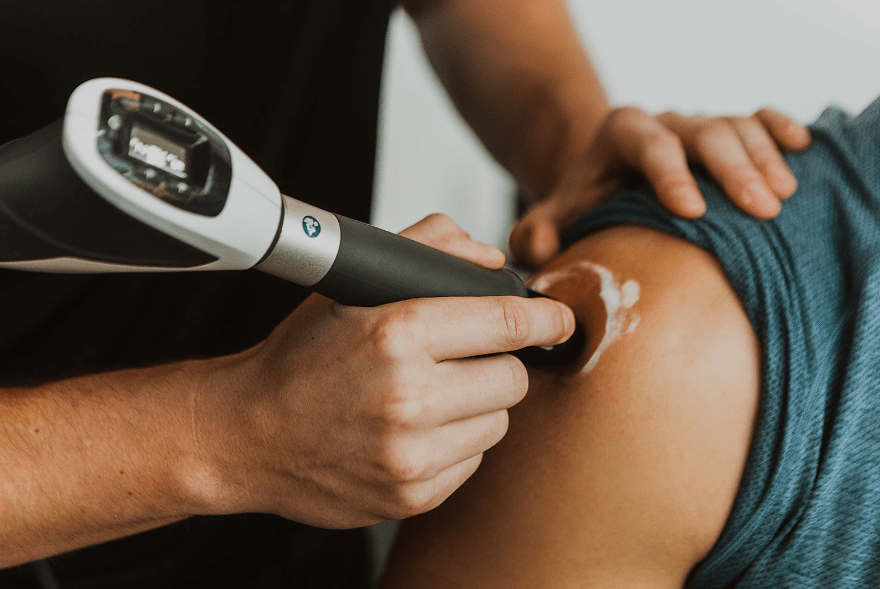Shockwave Therapy
Shockwave is a cutting edge and highly effective treatment, which we are proud to offer across multiple clinics.
Shockwave Therapy Available in Manchester, Warrington, Knowsley & Cheshire Oaks
Shockwave can be used to recover from numerous injuries; achilles, hamstring, rotator cuff, tennis elbow to name but a few. Shockwave has been used in elite sport for many years, but is only now becoming more widely available to the general public, and recreational athletes.
So shockwave, despite the name, is not a therapy that delivers an electric shock. It works by delivering a shockwave of pressure, similar to a Thera-gun, but higher intensity.
This is not another fad or gimmick treatment, it is used widely in the NHS in settings where the budget allows, and has been used in sport for 20+ years, first being approved by the FDA in the year 2000 for plantar fasciitis.
The Evidence
There is strong evidence for a large number of conditions. We will spare you the details, but give you the references should you wish to know more! We’ve broken it down into evidence for general conditions, and also specific conditions.
- Patellar Tendinopathy
- Plantar Fasciitis
- Achilles Tendinopathy
- Calcific tendinopathy
- Rotator Cuff Tendinopathy
- Tennis / Golfer’s Elbow
- Greater Trochanteric Pain Syndrome
- Insertional Hamstring Tendinopathy
What does the treatment Involve?
Patients tend to say that after 3 sessions they see notable improvement in their function and pain.
And it’s always nice to know that the complications are more or less non existent…
While it is a painful treatment, there are no recorded complications that limit the healing process or that cause lasting injury.
- Recommendation is 6 session minimum.
- Between 5 and 10 days between sessions.
- The shockwave is applied using ultrasound gel and the pressure built up to effective 2.5 bar
- 2000-4000 pulses will be delivered over 10mins
- Your shockwave will be completed alongside a progressive loading protocol to ensure the best possible outcome

Shockwave Packages (at selected clinics)
To be assessed for your suitability for Shockwave Therapy - please book a standard Physiotherapy Assessment. This is essential before commencing any course of shockwave treatment.
What patients say about
Shockwave
FAQ's
There is strong evidence for a large number of conditions. We will spare you the details, but give you the references should you wish to know more! We’ve broken it down into evidence for general conditions, and also specific conditions.
Shockwave therapy, also known as Extracorporeal Shockwave Therapy (ESWT), is a non-invasive treatment modality used within some of our clinics. It involves the application of acoustic waves to targeted areas of the body to stimulate tissue repair, promote healing, and relieve pain. Originally developed to disintegrate kidney stones, shockwave therapy has since been successfully adapted for the management of various musculoskeletal conditions.
During a shockwave therapy session, some patients may experience mild discomfort or a sensation of pressure at the treatment site. However, the intensity of the sensation varies depending on individual pain thresholds and the specific condition being treated. To minimise discomfort, the therapist can adjust the intensity of the shockwaves according to the patient’s tolerance level.
Shockwave therapy works by delivering high-energy acoustic waves to targeted areas of the body, such as injured tendons or muscles. These acoustic waves create microtrauma within the tissues, stimulating the body’s natural healing response. The shockwaves also help to increase blood flow to the affected area, promote the formation of new blood vessels, and stimulate the release of growth factors, all of which contribute to tissue regeneration and pain relief.
Shockwave therapy typically does not cause fatigue or tiredness in patients. In fact, many individuals report feeling energized and relieved after their treatment sessions. However, it’s essential to listen to your body and rest if needed following a session, especially if you have undergone an intense treatment or if you are managing a chronic condition.
The cost of shockwave therapy can vary depending on factors such as the number of sessions required. Shockwave therapy sessions begin with a Shockwave Assessment which is £55. If Shockwave is deemed safe and appropriate during this assessment your first treatment can be done within the Assessment – making the first session total £75. Follow up sessions are £75 per session, however we offer some fantastic discounted package options for Shockwave treatment too, which can be found on our “packages” page. Some insurance plans may cover a portion or all of the cost. This is completely dependant on your personal policy so please check with your insurance provider to determine coverage options.
Shockwave therapy has been shown to be effective in treating a variety of musculoskeletal conditions, including plantar fasciitis, tendonitis, and muscle strains. Many patients experience significant pain relief and improvement in function following shockwave therapy. However, the effectiveness of the treatment may vary depending on factors such as the severity of the condition, the patient’s overall health, and adherence to post-treatment recommendations.
The number of shockwave therapy sessions required for plantar fasciitis can vary depending on the individual’s response to treatment and the severity of the condition. In general, a typical course of treatment may involve 3 to 5 sessions spaced one to two weeks apart. However, some patients may require additional sessions for optimal results. Your healthcare provider can assess your progress and adjust the treatment plan accordingly.
The benefits of shockwave therapy include:
- Non-invasive: Does not require surgery or incisions.
- Pain relief: Many patients experience immediate pain reduction.
- Improved function: Enhances joint mobility and overall function.
- Accelerated healing: Stimulates tissue repair and regeneration.
- Minimal side effects: Compared to surgery or medication, shockwave therapy has fewer side effects and a shorter recovery time.
Accepted Insurance
Some insurance providers cover Shockwave treatment. Please get in touch with our Admin team to find out if you could be covered.
Take a look at our cost saving Packages to get the most out of your treatment with us.